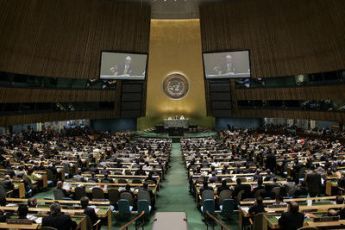UN human rights envoy to Sudan decries domestic repression
September 17, 2010 (GENEVA) – The United Nations’ Human Rights Envoy to Sudan Mohamed Chande Osman on Saturday introduced his report to the Human Rights Council in Geneva and noted concerns over restrictions on press and political freedom as well as deadly ethnic tension in the south and proliferation of the conflict in Darfur region.

The report, which covers the period from May to August 2010, stated that the human rights situation in Sudan after April’s disputed elections had been “characterised by restrictions in the enjoyment of civil and political rights, and curtailment of the freedom of expression and the press.”
Chande advised the government to continue the process of “law reform to conform to international human rights standards” and also expressed concern over the ongoing application of the death penalty, urging the government to ensure that its application occurs in “a very strictly defined set of circumstances.”
On Darfur, the report commended the Sudanese government for implementing some of the recommendations made by the Council’s Group of Experts on Darfur. However, it later said that the expert was “deeply concerned that a significant number [of these recommendations] had not been implemented.”
The report lamented that the conflict in Darfur has spawned new patterns of violence, including “armed hostilities, banditry and criminality, direct and indiscriminate attacks on civilians by all parties to the conflict, and inter-communal violence.”
Two days ago, Chande urged the government to conduct investigations into an attack reportedly carried out by a group of suspected pro-government militiamen on Tabra village in north Darfur where at least 37 people were killed as a result.
On south Sudan, Chande’s report voiced concern over increases in communal violence and great loss of lives it has caused, particularly among women and children.
The report said that the south continues to experience “tensions between ethnic groups, competition over resources, resistance to disarmament and occasional acts of indiscipline by armed state agents such as members of the Sudan Peoples’ Liberation Army are the most common causes of the violence in the South.”
Chande’s report also said that he was “deeply troubled by the violence and widespread human rights abuses that characterised the post-election period in Southern Sudan.”
The report finally urged the authorities in Sudan to “promptly address the deficit in the protection of human rights” and recommended that the Human Rights Council remain “engaged” Sudan until it was assured of “tangible and lasting improvement in the human rights situation on the ground.”
Sudan’s ambassador to the council, John Ukec Lueth Ukec, responded to Chande’s report by saying it is “relatively balanced” in compare to previous reports.
However, UKEC complained that Sudan continues to be “inundated” with various human rights mechanisms such as the Independent Expert, the United Nations Mission (UNMIS), the Hybrid Mission in Darfur (UNAMID) and various other United Nations human rights monitors.
He suggested that the council should “devote the same effort used on targeting Sudan to further building and developing national capacities through technical assistance.”
Ukec concluded by reiterating Sudan’s demand to terminate the mandate of the independent expert.
The Sudanese government has been lobbying hard to terminate the Special Procedure mandate on the country. The interactive debate held between the council’s members over Chande’s report revealed a divergence of opinions as to whether the expert’s mandate should be extended or terminated.
Whereas representatives of Western countries, including Sweden, Australia, Ireland, Switzerland, UK, France, US, Canada as well as the European Union all expressed support for renewing the mandate, those of Arab countries and China backed Sudan’s demand for terminating the expert’s mandate.
(ST)

DASODIKO
UN human rights envoy to Sudan decries domestic repression
The word urge never exists in Islamist dictionary. UN should act promptly against these maggots in Khartoum.